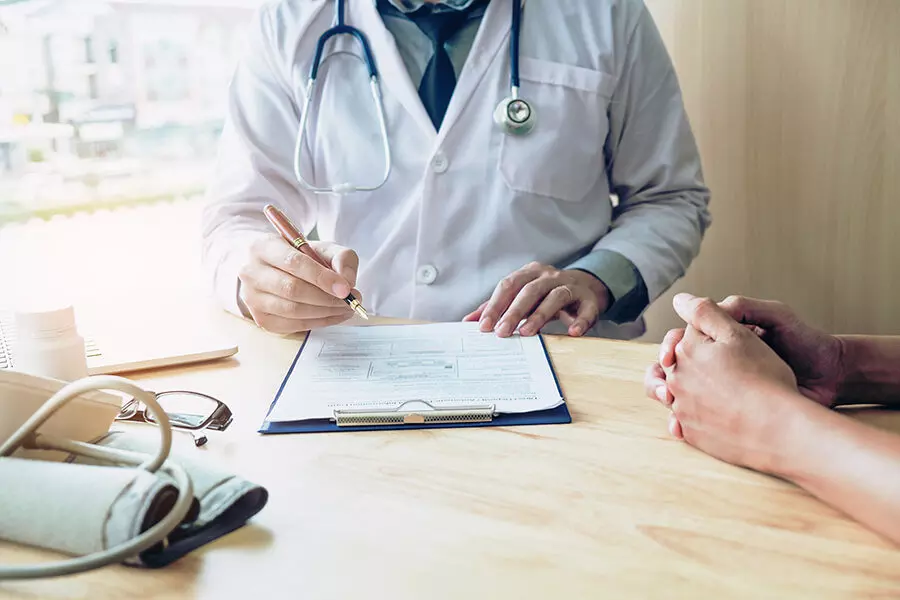What is Cancer?
Cancer is a group of more than 100 different diseases. It develops when cells in the body undergo genetic changes that interfere with their normal development.
The changed cells may form a mass called a tumour. This tumour can be either benign or cancerous. A benign tumour can grow, but will not spread throughout the body. A cancerous tumour can grow and spread.
Not all cancers form tumours. Types that don’t include leukaemia, most lymphomas, and myeloma.

What types of cancers are there?
Carcinomas
Carcinomas are the most common types of cancers. They normally start on the skin, or the tissue that covers the internal organs and glands.
Carcinomas normally form solid tumours. Examples of carcinomas include prostate cancer, breast cancer, lung cancer and colorectal cancer.
Sarcomas
Sarcomas form in the tissue that forms and connects the body. This includes the fat, muscles, nerves, tendons, joints, blood and lymph vessels, cartilage, and bones.
Leukaemia
Leukaemia is a cancer of the blood. It begins when healthy blood cells start to change and grow uncontrollably.
There are four major types of leukaemia: acute lymphatic leukaemia, chronic lymphatic leukaemia, acute myeloid leukaemia, and chronic myeloid leukaemia.
Lymphomas
Lymphoma is a cancer that begins in the lymphatic system: the network of vessels and glands that helps to fight infection in your body.
There are 2 main types of lymphomas: Hodgkin Lymphoma and non-Hodgkin lymphoma.
What are the early warning signs of cancer?
The following symptoms could be early signs of cancer, and it is important to see your GP if you notice them.
- A change in your bowel or bladder habits
- A sore that does not heal
- Unusual bleeding, bruising or discharges
- Thickening or a lump (breast or elsewhere)
- Indigestion or difficulty in swallowing
- Obvious change in a wart or a mole
- Nagging cough or hoarseness
- Fatigue
- Persistent fevers and night sweats
- Persistent muscle or joint pain


What are the risk factors of cancer?
Modifiable risk factors are ones brought about by your lifestyle and environment. Unmodifiable factors include inherited factors, like a genetic predisposition.
The causes of many cancers are not yet known, but it is known that certain factors can increase your risk, including:
- Smoking and drinking
- Poor diet
- Lack of physical activity
- Being overweight or obese
- UV radiation from the sun (or other sources)
- Your health and infections
How do you diagnose cancer?
The diagnostic process for cancer normally starts at the GP, with the patient presenting unusual symptoms. This might be a lump on the breast, unexplained pain, or weight loss without an apparent cause.
Alternatively, as part of your general health check-ups, you might have a screening test such as a mammogram, colonoscopy, faecal occult blood test or general blood test. These aim to identify cancer early, when it is at a stage that is more likely to be curable.
Each cancer diagnosis will follow its own path. It normally starts with a physical examination, followed by blood tests, or urine tests. The GP might also ask for an x-ray, CT scan, or an MRI as appropriate.
Cancer will usually then be confirmed via a biopsy. This involves the doctor will take a sample from the affected tissue and having it examined under a microscope.


How do you treat cancer?
There are many ways to treat cancer. Your own treatment options will depend on the type of cancer you have, how advanced the cancer is, and the positioning of the tumour.
Traditionally, cancer treatment used to focus on where the tumour was located, and treatment followed a standard course for all cancers in that location.
Today, cancer therapies have evolved to become more specific and more personalised. Nowadays, patients are given a more targeted approach in terms of the chemotherapy and immunotherapy they receive.
What types of biopsies are there?
- Bone marrow biopsy
- Endoscopic biopsy (e.g.: Gastroscopy and Colonoscopy)
- Needle biopsy
- Skin biopsy
- Surgical biopsy
Complementary cancer treatment:
- Acupuncture
- Aromatherapy
- Exercise
- Hypnosis
- Massage
- Meditation
- Music therapy
- Yoga

Hunter Valley Oncology is here to help you make sense of your cancer diagnosis and treatment. We offer sound medical advice, provide personalised care to suit you, and give you access to cancer specialists and allied health professionals.
